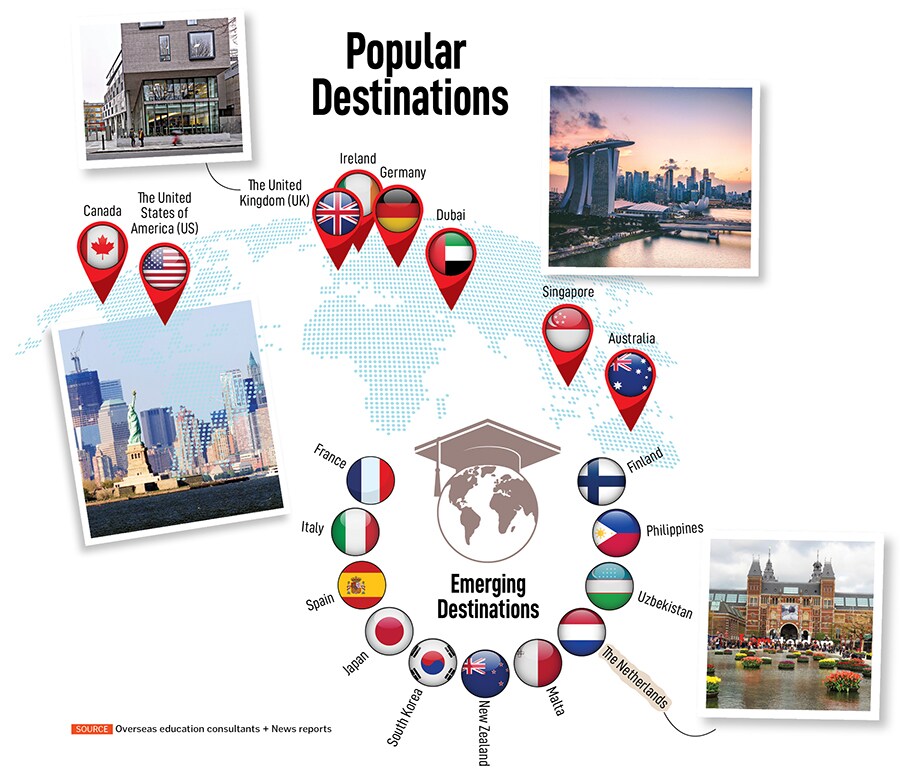The resident of Jabalpur in Madhya Pradesh is among a growing tribe of Indian students who are enrolling themselves in global universities in pursuit of quality education and specialised courses.
According to a report by the Ministry of External Affairs, more than 13 lakh Indian students went overseas for education in 2022 with most preferring universities in the US, Canada, the UAE and Australia. A report by Statista published last October reveals that the number of Indian students studying abroad increased by almost 65 percent between 2017 and 2022.
India was once believed to be the education hub of the world. With universities like Takshashila and Nalanda—some of the first universities in the world—the country saw scholars from across the globe coming to the country in pursuit of knowledge. In the 1900s, though, many Indians, especially those belonging to affluent or elite families, sent their children abroad for higher education. Many youngsters returned to India and went on the become businessmen, scientists, professors, and freedom fighters.
Currently, lakhs of Indian students take the flight abroad for their undergraduate or postgraduate programmes after doing their due diligence and research. Overseas education consultants say rising awareness about the benefits of studying abroad, globalisation, advancements in technology, easy access to information and the ease of applying to foreign universities are some of the contributing factors to this trend.
![]()
Sonam Moondhra, 42, managing director of Mumbai-based education consultancy Eduabroad Consulting, says there has been a significant growth in Indian students opting for overseas education over the years. “While many students choose to pursue undergraduate studies in India due to the quality of education, there has been a notable increase in the number of students opting for master’s programmes abroad. This year, in particular, we’ve observed a doubling in the number of students going for their master’s degrees overseas," says Moondhra, who has almost two decades of experience as an education consultant.
Forbes India spoke with many students who gave a peek into their mindset and shared reasons for studying abroad.
Rasleen Grover, a 2021 graduate from Delhi University, is one of them. The 23-year-old spent a year-and-a-half researching the best courses, colleges and countries. Last year, she joined the Technical University in Munich, Germany, to pursue an MSc in politics and technology with a specialisation in sustainability. Grover had applied for and got into other colleges in the US and UK, but Germany was on top of her list. “I want to make a career in sustainability and there’s a lot of scope for this sector in Europe… they have been deploying a lot of funds and the job market is extremely lucrative compared to India," she says. “I chose Germany because there’s no tuition fees. My course is interdisciplinary and that’s what I wanted… bringing two different worlds together."
Grover believes one can easily recover the money invested in studying in Germany. Since there are no tuition fees, students can avoid taking an education loan. One of the biggest downsides, though, according to her, is the language barrier. Learning to speak German is a must before moving to the country, and that can get challenging for Indian students who are more comfortable with English. “I feel higher education here is even cheaper than in India, and by working part time, students can make a living out of it easily," says Grover, who sees herself as a global citizen and wants to work in Germany before approaching bilateral organisations like the World Bank, United Nations etc for a job.
While Grover went abroad for her postgraduation, 23-year-old Tanesha Agrawal decided to study in Toronto, Canada, for both undergraduate as well as postgraduate programmes. Between 2019 and 2023, she completed her BA (Hons) in political science from York University, Toronto, and is currently doing a postgraduate certificate course in public relations (PR) from Humber College. Agrawal’s reasons for choosing Canada were easy immigration and the high probability of getting citizenship quickly. Canada’s welcoming culture was a tempting reason too. “I chose Toronto because it has a fast-paced lifestyle, similar to New York City, but not as intense. It has lots of opportunities and a great culture scene for my field," says Agarwal.
![]()
Before finalising Canada, she spoke with Edu Nirvana, a consultancy service in Bhopal, Madhya Pradesh, and studied metrics such as university reviews, social life, school clubs, work-life balance and employment rate. Agarwal, who got into other colleges such as UBC, Queens, Western and Wilfred Laurier, chose York University because of its location, Toronto—it’s Canada’s financial hub and lends itself to a lot of networking opportunities.
Agrawal emphasises that an Indian student doesn’t feel like an outsider in Canada because of its huge immigrant population. The negatives, however, include high cost of living, a competitive job market and lower minimum wages compared to countries like Australia. “Being in Canada allows me to pursue PR without restraining my creative thinking, which might have been the case in India," she says, adding that she also appreciates Canada’s proximity to the US.
Several overseas education consultancies in India list down the US, UK, Germany, Canada and Singapore as the most popular destinations for overseas education for Indian students. According to Moondhra, the US and UK have always enjoyed preferential status due to the high rankings of their universities globally. However, as per data and queries received by her consultancy, there has been a shift in preferences in the past few years, particularly in the US, because of factors such as the escalating cost of education and limited job opportunities, particularly for non-STEM (science, technology, engineering and mathematics) students.
According to data gathered by Eduabroad Consultancy, cities like Dubai, which is evolving into a financial hub, or countries like Singapore, known for its safety, are gaining traction among parents and students. Additionally, Australia, which is already a popular destination for education, is gaining more popularity, especially for postgraduate studies, owing to favourable trade agreements with India and opportunities for long-term stay visas.
Chhattani, who completed her undergrad in engineering from Bengaluru, believes studying in a country like Australia has not only benefited her in terms of gaining academic knowledge but it has also fuelled her personal growth as an individual.
Apart from Australia, another country which is seeing a rising number of queries for overseas education is Ireland. Roshni D’Souza, who recently graduated from the University of Galway after doing a master’s in journalism, says the biggest advantage for Indian students in Ireland is that the country uses English as its first language. “I also chose Ireland because it is among the top few countries when it comes to the freedom of press… and as someone who studies journalism, it is important that I get to practise my skills in a country where I don’t have to restrict myself in terms of press freedom and don’t have to worry about governmental control," says the 24-year-old who graduated with a bachelor’s degree in mass media from Mumbai.
![]()
D’Souza was contemplating going to the UK for her master’s, but decided against it because of the reasons mentioned above as well as having the comfort of a few relatives in Ireland. It also helps, explains D’Souza, that Ireland is accepting of people from different ethnicities and colours. The only drawback is the high cost of living. “Before you get into Ireland, you need to know what the next two years of your stay are going to look like," says D’Souza, who is currently in the process of sorting out her work permit.
Some new countries too are emerging as ‘favourable options’ for Indians looking to study abroad. These include Japan, South Korea, New Zealand, Finland and the Netherlands. Private career counsellor Karan Gupta says New Zealand has been getting immense attention for its high-quality education system and friendly atmosphere. Students are also considering the Netherlands due to its innovative approach to education, offering diverse programmes that are taught in English. “Recently, we have seen South Korea coming up as a hub for technology and innovation, offering unique cultural experiences and high-quality education in fields like electronics, telecommunications and design… many Indian students are opting for the country," says Gupta.
In September 2023, South Korean minister Lim Sang Woo announced the ‘Study Korea 300K project’ which aims to position the country as a global education powerhouse with students, researchers and skilled workers coming to the country from across the world. Moondhra explains that South Korea’s universities are gaining recognition globally, partly fuelled by the popularity of K-Pop and K-dramas. The country has reasonable education costs, offers generous scholarships and English-taught programmes to attract students. Similarly, Japan, with its rich cultural heritage and modern lifestyle, is being talked about as a promising destination for studies. Moondhra says Finland, the Netherlands and Ireland in Europe are emerging as value-for-money destinations, offering programmes in English, job prospects and possibilities for long-term residency visas.
![]() South Korea is emerging as a popular destination with Indian students for their increasing familiarity with the country through K-pop (superstar Psy seen performing at the Korea University in Seoul) and K-dramasImage: Anthony Wallace / AFP
South Korea is emerging as a popular destination with Indian students for their increasing familiarity with the country through K-pop (superstar Psy seen performing at the Korea University in Seoul) and K-dramasImage: Anthony Wallace / AFP
Emerging Courses
Consultants tell Forbes India that students are increasingly opting for specialised master’s programmes such as business analytics, financial engineering, UI/UX design, education management and sustainability policy. Additionally, fields like robotics, artificial intelligence, machine learning, engineering management for engineering students, and specialised areas in law and design are becoming popular. “The trend indicates a preference for niche programmes that offer domain expertise and better career opportunities," says Moondhra.
Aniket Mehta [name changed] did one such course from Queen Mary University of London, UK. The 24-year-old pursued an MSc in artificial intelligence after completing his BTech in information technology from Mumbai. “The duration of courses, typically spanning a year in the UK as opposed to two years in the US, resulted in comparatively lower expenses for both education and living there," says Mehta, who believes that overseas education provides one with cross-cultural skills and a network of international contacts apart from helping with decision-making skills, making you independent and flexible.





